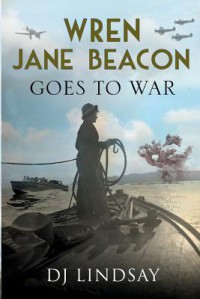Currently reading
Gabriela, Cravo e Canela
Progress:
157/358 pages
Seven Pillars of Wisdom: A Triumph (The Authorized Doubleday/Doran Edition)
Progress:
189/672 pages
The Creature from Jekyll Island: A Second Look at the Federal Reserve
Progress:
41/608 pages
Peter the Great
Progress:
472/934 pages
Under the Loving Care of the Fatherly Leader: North Korea and the Kim Dynasty
A Time for Trumpets: The Untold Story of the Battle of the Bulge
Progress:
191/712 pages
The German Army 1933-1945
Progress:
198/598 pages
Corporal Hitler and the Great War 1914-1918: The List Regiment
Progress:
22/238 pages
WELCOME WREN JANE BEACON!
— feeling amazing 


| "WREN JANE BEACON GOES TO WAR" is a novel that engaged me from the start with the story of Jane Beacon's solo journey in a naval cutter in the dead of night from Dover, across the English Channel, to the besieged beaches of Dunkirk on May 30, 1940. If the reader of this review has seen the Christopher Nolan movie, "Dunkirk', you will have already formed in your mind images of British and French soldiers --- sorely fatigued and/or wounded --- seeking to be evacuated to Britain, all the while being harried by air attacks from the Luftwaffe and distant shellfire. Beaches littered with the detritus of a beaten army. An army pressed on all sides --- with only the Channel open to it as a means of escape --- by the full force of the victorious Wehrmacht. I became instantly gripped by D.J. Lindsay's descriptions of the evacuation from Dunkirk - which went on for several days -- and the heroic role played by Wren Jane Beacon in it. Furthermore, I became so caught up in what I was reading that I felt like I was a witness to the evacuation itself. I could almost hear the banshee-like wails of the Stuka dive bombers as they attacked the ships evacuating the troops from the beaches, as well as the rumble from the Heinkel 111 or Dornier bombers horizontally letting loose their store of bombs onto the evacuating ships, and strafing attacks from twin-engined Messerschmitt 110 fighters, as well as from the redoubtable single-seat Messerschmitt 109 fighter that made a strafing attack on Beacon's boat. From Dunkirk, the novel goes on to show the struggle Beacon endured afterward upon her return to Britain. Then we are given greater access -- with the help of a journalist employed to interview '1095 Wren Beacon' -- to Jane Beacon's life and her experiences as a WREN (Women's Royal Naval Service) from the time she joined the service in October 1939, scarcely a month after the outbreak of the Second World War. Jane Beacon is a highly intelligent, gutsy, and resourceful woman in her late teens with a lifelong love of the sea. She was also an experienced sailor, having had the opportunity to further enhance her boating skills (through the influence of her Uncle George, an ex-Royal Navy officer) as the only woman among a crew of young men who sailed down to the Mediterranean on a 6-month cruise. (They cut the cruise short and returned to Britain in August 1939, shortly before the outbreak of war.) But sometimes, as the novel will show, Jane Beacon gets into situations that get her in trouble with higher authority in the Royal Navy, as well as with the Wren top leadership, who, in the early stages of the war, struggled to justify their existence and be a credible asset in a navy, many of whose sailors were skeptical or downright opposed to women being in its ranks. I loved this novel and learning something about the Wrens, as well as some naval lore. The author made the characters come alive across each page. I look forward to reading the other novels in the series. |













